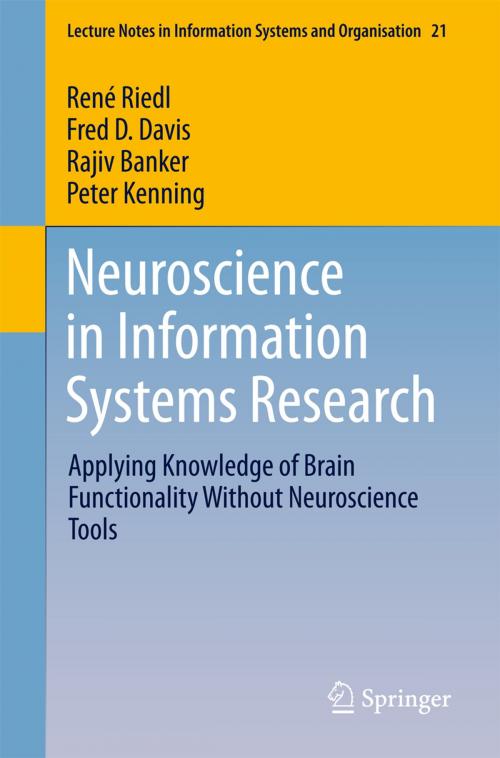Neuroscience in Information Systems Research
Applying Knowledge of Brain Functionality Without Neuroscience Tools
Nonfiction, Computers, Application Software, Business Software, Internet, Business & Finance| Author: | René Riedl, Fred D. Davis, Rajiv Banker, Peter H. Kenning | ISBN: | 9783319487557 |
| Publisher: | Springer International Publishing | Publication: | January 25, 2017 |
| Imprint: | Springer | Language: | English |
| Author: | René Riedl, Fred D. Davis, Rajiv Banker, Peter H. Kenning |
| ISBN: | 9783319487557 |
| Publisher: | Springer International Publishing |
| Publication: | January 25, 2017 |
| Imprint: | Springer |
| Language: | English |
This book shows how information systems (IS) scholars can effectively apply neuroscience expertise in ways that do not require neuroscience tools. However, the approach described here is intended to complement neuroscience tools, not to supplant them. Written by leading scholars in the field, it presents a review of the empirical literature on NeuroIS and provides a conceptual description of basic brain function from a cognitive neuroscience perspective. Drawing upon the cognitive neuroscience knowledge developed in non-IS contexts, the book enables IS scholars to reinterpret existing behavioral findings, develop new hypotheses and eventually test the hypotheses with non-neuroscience tools. At its core, the book conveys how neuroscience knowledge makes a deeper understanding of IS phenomena possible by connecting the behavioral and neural levels of analysis.
This book shows how information systems (IS) scholars can effectively apply neuroscience expertise in ways that do not require neuroscience tools. However, the approach described here is intended to complement neuroscience tools, not to supplant them. Written by leading scholars in the field, it presents a review of the empirical literature on NeuroIS and provides a conceptual description of basic brain function from a cognitive neuroscience perspective. Drawing upon the cognitive neuroscience knowledge developed in non-IS contexts, the book enables IS scholars to reinterpret existing behavioral findings, develop new hypotheses and eventually test the hypotheses with non-neuroscience tools. At its core, the book conveys how neuroscience knowledge makes a deeper understanding of IS phenomena possible by connecting the behavioral and neural levels of analysis.















